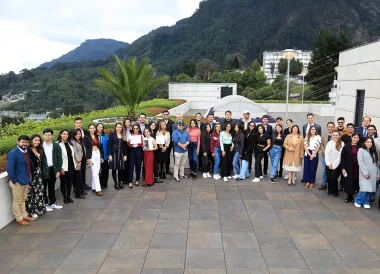Comercio Electrónico
8 de mayo de 2023
Crypto-asset regulation in colombia: recent trends
The regulation on crypto-assets is a relevant index to determine the digital business climate in a country. Like any emerging technology, its early adoption in a market and adequate regulation can be an important step in the digital transformation processes in companies, the government and support digital entrepreneurship. The efficiency and data decentralization of blockchain and cryptocurrencies generate disruptive effects in certain markets and may also create concern about eventual illegal activities deriving from the technology’s relative anonymity.
In Colombia, several public entities have issued regulation and opinions on crypto-assets. This is precisely the first trend that we want to highlight. In Colombia there is a diversity of public entities that have touched upon different legal issues related to crypto-assets, namely: financial, exchange, tax, commercial, compliance and contractual issues, among others.
The following is a list with the main existing regulation and opinions:
(a) Financial Superintendence, Chapter XVIII External Circular Letter No. 041 of 2015;
(b) Decree 2555 of 2010.
(c) Regulatory Decree 1068 of 2015 (article 2.17.2.4.1.1);
(d) External Resolution No. 8 of May 5, 2000;
(e) External Resolution No. 1 of May 25, 2018;
(f) External Circular Letter No. DODM-144 of September 14, 2018;
(g) External Circular Letter No. DECIP-83 of August 27, 2021;
(h) Central Bank Opinion No. JDS-03409 of February 16, 2011;
(i) Central Bank Opinion No. JDS-19704 of September 12, 2016;
(j) Central Bank Opinion No. C19-110904 of June 21, 2019;
(k) Central Bank Opinion No. C21-70969 Q21-4417 of December 9, 2021;
(l) Financial Superintendence Opinion No. 2020079520-001 of May 15, 2020.
This is an effect of the transversal use of crypto-assets in different economic sectors and for different activities. However, if greater legal certainty is sought, the government could adopt a public policy document defining the vision and direction of the relationship between the public and the private sectors in relation to these digital assets.
In general, the Colombian authorities agree on the following characteristics related to crypto-assets as a basis for their regulation in each legal field and to determine the risks of the crypto title-holders who trade these intangible assets:
- Crypto-assets are not currency, as the only monetary and account unit that constitutes a legal tender and means of payment with unlimited release power, is the Colombian peso issued by the Central Bank of Colombia (bills and coins);
- Crypto-assets are not money for legal purposes;
- Crypto-assets are not a currency, since it has not been recognized as a currency by any international monetary authority nor is it supported by central banks;
- Crypto-assets are not cash or cash equivalent;
- There is no obligation to receive crypto-assets as a means of payment;
- Crypto-assets are not financial assets or investment property in accounting terms;
- Crypto-assets are not securities, so their mention as such or assimilation should be avoided.
The above characteristics have been consistently upheld by different Colombian government documents and denote an interpretation of intangibles that is always based on traditional notions of assets.
Crypto-assets have been defined in Colombia as intangible assets and therefore are likely to be contributed to the capital of corporations, provided that (i) they comply with accounting laws and secondary rules and legal regulations; and (ii) that the partners approve their appraisal. Based on these arguments, the Colombian government expressly affirmed a change in its doctrine, confirming that shareholders can contribute crypto-assets in the form of a contribution in kind. The foregoing, subject to a series of requirements and recommendations, opens the possibility of incorporating crypto-assets as part of the incorporation of companies in Colombia.
Colombian residents who have crypto-assets as part of their assets must declare them in their annual income tax returns. The value for which they must be declared will be for their equity value, either as an intangible asset (investment) or inventory.
On the accounting side, it is recommended that a separate unit of account be created for the recognition, measurement and disclosure of transactions and other events or occurrences that are related to cryptocurrencies, which could well be called “crypto-assets” or “virtual assets”.
If the crypto-assets are traded in a foreign currency, the value of the assets in foreign currency is estimated in national currency at the time of their initial recognition at the official exchange rate, less credits or payments measured at the same official exchange rate of the initial recognition.
Colombian residents who have equipment, resources and work that are integrated into the crypto mining activity, allowing them to obtain virtual currencies in exchange for the services provided in the network and/or by way of commissions, receive taxable income in Colombia, by virtue of the aforementioned criteria. Likewise, it is clear that resident individuals and national companies are taxed not only on their income from a national source but also from a foreign source income and on their assets owned in the country and abroad. From the equity point of view, as long as these coins correspond to intangible assets, capable of being valued, they form part of the equity and can lead to the obtaining of (presumptive) income.
For instance, the purchase and sale of real estate with payment through crypto-assets is an exchange of an asset whose payment will be made through the delivery of an intangible asset. The tax obligations associated with income tax will be those derived from the execution of the exchange contract. Carrying out the exchange will affect the assets of the party delivering the crypto-asset; the payment of the price will generate an equity decrease due to its disposal. On the other hand, depending on the real estate valuation, seller may increase its assets by carrying out the respective exchange, or equate the equity value of the crypto-asset delivered. Consequently, the party delivering the crypto-asset must determine the equity value of said asset, and analyze whether, on the occasion of the exchange, an income for the difference between the tax cost of the asset and the value of its disposal was obtained. The payment of the property through crypto-assets may represent an increase in equity in the head of the property seller if the equity value of the crypto-asset is higher than that of the real estate. The capital increase must be reported in that party’s accounting and income tax return. To the same extent, the real estate seller must determine the equity value of said property, and verify if, on the occasion of the exchange, an income for the difference between the fiscal cost of the real estate and the value of the sale was obtained. The parties must comply with the provisions of the Colombian Tax Statute for the purpose of determining the minimum prices for the sale of the goods subject to the exchange.
As in other jurisdictions, Colombia is no exception for crypto-assets being used in criminal activities. Cases of criminal use, fraud and the use of crypto-assets for payments related to computer attacks and ransomware as well as for payments related to extortion are becoming more frequent. Crypto-assets can also be used as instruments for money laundering, terrorist financing and other criminal activities, in view of which the administrators of the companies that participate in the crypto-asset market must deploy: i) the maximum due diligence in the knowledge of the ends of the operation (including associates, employees, clients, contractors and suppliers, and their final beneficiaries), in regards to the prevention of ML/TF; and, ii) the diligence that a businessman in good faith would take into account to prevent the phenomenon of asset laundering or money from the public being illegally collected or any other damage to the public or private interest being generated through such company. Those who carry out operations with crypto-assets decide in a responsible, conscious and autonomous manner, at their own expense and risk, to assume the possible losses that could be derived from this type of transaction.
The difficulty of clearly defining crypto-assets has been used by criminals to deceive investors and to carry out illegal collection of funds and Ponzi schemes with business models and strategies that can only be carried out by financial entities authorized by the Colombian government.
The growth of the crypto-asset market, in particular cryptocurrencies, depends on the ability of crypto-assets being used in many activities. So, while there is need for a clear regulatory framework that allows measuring risks, it is also important that absolute prohibitions or regulatory disincentives disappear.
In the past two years, a bill that regulates the relationship between wallets, exchanges and platforms in relation to crypto assets has advanced for approval in the Colombian Congress. In the first place, this proposed legislation proposes a series of definitions, among others, the following:
- Wallets: These are the virtual media in which the public and private encryption keys are stored.
- Crypto-assets Exchange Services: these are the following services: (i) Administration of crypto-assets exchange platforms. (ii). Provision of custody and/or storage services for crypto assets. (iii). Exchange or transfer between crypto-assets and fiat currency, or between one or more crypto-assets. (iv). The supplementary or analogous services related to sections i, ii and iii above.
- Crypto Asset Exchange Platform (PIC): These are computer applications or interfaces, internet pages or any other means of electronic or digital communication through which the Crypto-asset Exchange Services are provided.
- Crypto-asset Exchange Service Provider: It is a national business entity or a branch of a foreign company, in charge of operating, managing and guaranteeing the operation of the PIC, registering with the Chamber of Commerce of its main domicile and responsible for compliance with the obligations.
- Unique Registry of Crypto-asset Exchange Platforms (RUPIC): It is an electronic public registry managed by the Chambers of Commerce whose objective is to allow anyone to access the information published in said registry, and to verify that the Service Providers of Crypto-assets Exchange as holders are duly registered.
- PIC Operations Manual: Document that contains the requirements and internal parameters of the PIC for the provision of Crypto-asset Exchange Services.
As a principle of interpretation of the crypto-asset market, it is established in the draft bill that crypto-assets are negotiable directly by their owners. The operation of the different crypto assets, their rules belong to the private sphere of the users, who, based on the principles of free market and free competition, must seek to be informed about the risks inherent in trading with assets of any kind.
The Crypto-asset Exchange Service Providers, Colombian or foreigners, must comply with the following requirements:
- Be incorporated as a commercial company domiciled in Colombia or as a branch of a foreign company, and be duly registered in the Colombian mercantile registry.
- Include as the exclusive corporate purpose the performance of activities classified as Crypto-asset Exchange Services.
- Establish and maintain a computer security program that ensures the availability and functionality of its computer systems, protecting said systems and all information stored in them, from unauthorized access, use and manipulation, the foregoing in accordance with the instructions that for this purpose imparted by the Ministry of Information Technology and Communications.
- Adopt control measures aimed at detecting and preventing money laundering and terrorist financing.
- Register in the Special Register for Crypto-assets Service Providers before the Chamber of Commerce of the entity’s main address, indicating the web domain and the information determined by the Ministry of Information and Communication Technologies.
- Report to the Financial Information and Analysis Unit the information that is required in compliance with money laundering regulations.
- Comply with the Colombian personal data protection regulations.
- Implement KYC and customer Due Diligence measures.
- Have an Operations Manual for the operation of the PICs that it manages, approved by the Ministry of Information Technologies and Communications.
According to the proposed bill, the Crypto-assets Exchange Service Providers are prohibited from:
- Offering or paying consumers interests or any other return or monetary benefit for the balance that they accumulate over time or maintain or for any operation directly or indirectly related to the exchange that they carry out with crypto-assets.
- Transferring under any title, lend or encumber crypto-assets or any other resource owned by consumers, stored by the Crypto-asset Exchange Service Provider, without the express authorization of the consumer.
- Developing any kinds of commercial network or multi-level marketing activity with crypto-assets, as well as their financial intermediation. Likewise, the administrators or service providers of crypto-asset exchange platforms may not allow the commercial distribution of crypto-assets to be carried out on their platforms through network or multi-level marketing activities or similar.
- Refraining from carrying out any conduct that leads to the massive and regular collection of funds from the public that additionally implies the absence of consideration in present or future goods or services that justify it or, even if such consideration exists, does not have a reasonable financial explanation.
The model proposed in this draft bill does not comprehensively regulate the different legal aspects of crypto assets. The relationship between some of the agents in the ecosystem can set aside a holistic vision that is necessary to obtain the benefits of intelligent regulation. It is not clear if the Financial Regulation Unit of the Colombian government agrees with the content of this bill.
To sum up, in Colombia there is a regulatory trend that has been transforming from a prohibition on the use of crypto-assets towards a vision more associated with the risks inherent in the market for these digital assets. The regulation remains disperse since different Colombian public entities with market supervision and surveillance functions have issued rules and opinions related to accounting, tax, contractual, exchange and financial issues, among others. An effective coordination between the different public entities that regulate crypto-assets is necessary to achieve legal certainty and stimulate the use of these digital assets as well as to generate a business environment that allows attracting investment. It is necessary to wait and see if the draft bill that is in progress becomes law so that wallets, exchanges and crypto-asset offering platforms in particular, are regulated more specifically in terms of their registration and duties as well as their liability towards consumers and users of crypto-assets.
Artículos Recientes
¡Ya está disponible el caso! Segunda versión del Concurso Laboratorio de Estrategia Legal #LSL
Invitamos a los estudiantes de pregrado y postgrado de todas las carreras a presentar [...]
Masterclass Legal Operations: Transformando la Función Legal Empresarial de Guardián de Riesgos a Creador de Valor.
El Departamento de Derecho de los Negocios y la Facultad de Administración de Empresas [...]
Conclusión del Proceso de Reforma al Investor-State Dispute Settlement
En la semana del 12 de julio de 2023, durante la sesión anual de [...]
El Departamento de Derecho de los Negocios de la Universidad Externado de Colombia abre convocatoria para la vacante de Asistente de Investigación
¡Sé parte de nuestro equipo de trabajo! Perfil del cargo: Asistente de Investigación Apoyar [...]
Docente del Departamento de Derecho de los Negocios participó en el libro Blanco de la Asociación de Derecho Internacional
La Asociación de Derecho Internacional (ADI), una de la organizaciones más antiguas y prestigiosas [...]
CRYPTO IN COLOMBIA: PROSPECTIVE 2022
By: Daniel Peña Valenzuela The volatility of the main cryptocurrencies seems to be once [...]
Convocatoria de Monitores.
El Departamento de Derecho de los Negocios se complace en anunciar la apertura para [...]
¿Se avecina una regulación de la Franquicia por parte del Gobierno? ¿O lo impedirá la Corte Constitucional?
Por: Juan Miguel Álvarez* y Diana Marcela Araujo* En diciembre del 2020, el congreso [...]
Especialización en Innovación Legal: Conviértete en un agente de cambio en el ámbito legal
La Especialización en Innovación Legal es mucho más que un programa académico: es una [...]
La exclusión de la convención sobre compraventa internacional de mercaderías en los términos y condiciones de los servicios multimedia de Apple.
En el presente artículo el autor analiza la cláusula de exclusión de la Convención [...]
Arbitration Nation: Where Polluters Win, the Planet Burns, and Lawyers Pop Champagne
Abstract In Arbitration Nation, polluters win, the planet burns, and lawyers pop champagne—all thanks [...]
Centro de Emprendimiento Externadista: Tres Años Impulsando la Innovación y el Emprendimiento en el Derecho
Palabras Clave: Emprendimiento en el derecho, Innovación legal, Emprendedores jurídicos, Objetivos de Desarrollo Sostenible, [...]


















